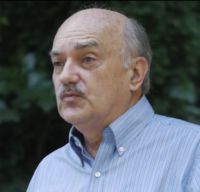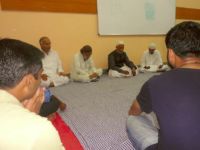Recently a number of organisations including Francis Xavier Movement (Italy), Henry Martyn Institute (Hyderabad), Interfaith Coalition for Peace (New Delhi), Zakir Hussain Institute of Islamic Studies – Jamia Millia Islamia (New Delhi), Indialogue Foundation (New Delhi) and Islamic Studies Association (Delhi) jointly organised a Seminar Building Communities of Peace: Muslim-Christian Relations in Asia on 11-12 February 2014. The sessions were held at three different places: the first session at St Xavier’s School (Raj Niwas Marg), the second at India Islamic Cultural Center (Lodi Road) and the third session in the prestigious Mir Anis Hall of the Jamia Millia Islamia.
Padmashri Prof. Mushirul Hasan in his key note address: Building Communities of Peace: C.F. Andrews and Sir Sayyid Ahmed Khan emphasized the intellectual curiosity of these two great men paved the way for their humanistic vision. Both Sir Sayyid and C.F. Andrews recognised that an insular attitude can raise only resistant walls whereas intellectual curiosity will build connecting bridges. Prof. Hassan argued that there is sufficient material in our own intellectual traditions that could help to reach out to the other for growing in mutual respect and understanding. These two leaders by their life and work have shown standing with the other is the quintessential aspect of dialogue, said Prof Hasan. His address set the tone for the seminar.
Prior to and following his key note address there were papers read on Christian Muslim Relations in the South Asian Neighbourhood: India, Sri Lanka, Pakistan and Bangladesh in the first session. The papers emphasised that through dialogue and mutual openness that Christians and Muslims will be able to understand each other’s religious faiths better and learn to respect it. For better understanding, both Christians and Muslims should to be ready to listen to one another. The purpose of dialogue ought to be, therefore, better understanding, peaceful co-existence and establishment of a fellowship of faith but not for conversion. Through mutual respect and acceptance of each other’s religious belief, eagerness to listen and learn from the other, we well be able to create a human community where all will live in peace and harmony, with freedom to practice our own religion.
The speakers highlighted the attitude of the Pope Francis who said, ‘Turning to mutual respect in interreligious relations, especially between Christians and Muslims, we are called to respect the religion of the other, its teachings, its symbols, its values. Particular respect is due to religious leaders and to places of worship. How painful are attacks on one or other of these.” So our future is in dialogue. We cannot afford to isolate ourselves from one another.
In the second session that was held at Indian Islamic Cultural Center Fr Joe Kalathil SJ spoke about his initiatives for peace between India and Pakistan. The discourse on peace between these two neighbors is mainly political and diplomatic. Often the agents of peace and mutual understanding are either ignored or seen to be unpatriotic. In this context, with much care and due respect to the sovereignty of both nations, Joe involve children as peace-makers. Following him, Rev Thomas Birla presented his understanding of the Hizmet Movement and its efforts for peace. The members of this movement wage a struggle against poverty and illiteracy through education all over the world. While the first session emphasized the cognitive aspects of dialogue, the second session presented the heart of dialogue in action.
In the third session that was held at Jamia Millia Islamia Prof Leo D Lefebure (Georgetown University, Washington DC) in his learned paper laid out the stimulating story of change in Catholic attitudes towards Islam that was brought about by Pope Paul VI. He told his listeners that “to appreciate the new spirit that Pope Paul brought to Christian-Muslim relations, it is necessary to have a sense of the earlier relationship”. He briefly noted some characteristics of the “old spirit” of Christian, and in particular, Catholic attitudes towards Muslims and Islam. He said: “at a time of widespread suspicion and hostility, Louis Massignon played a decisive role in developing warm relations with Muslims and in preparing his friend and colleague, Giovanni Battista Montini, for his later papal ministry as Pope Paul VI”. He briefly mentioned the new path in interreligious relations and religious freedom that was begun by Pope John XXIII and then discussed Pope Paul’s involvement in the interreligious events. Following him, Prof Akhtarul Wasey, the Director of Zakir Husain Institute of Islamic Studies, Jamia Millia New Delhi talked briefly about “A Common Word” Initiative. He was one of the signatories of the document that was sent to Pope Benedict VI and 27 other Christian leaders inviting them for dialogue with Muslims. He said that Christians and Muslims should work together for peace between them and in the world at large. They have the inner spiritual resources within their communities. These resources are also a common treasure between them.
Through a quiet reflection on these two days, one becomes aware of two important areas for further consideration. First, both Christians and Muslims should reach out to the other. While reaching out to the other, we learn to listen and thus we learn to find connections that have the potency to build a world of mutual understanding and peace in contrast to the present world of suspicion, war and violence. Second, what stops one from reaching out to the other? Ignorance! Does it not?
Both Christians and Muslims have to overcome the resistance of ignorance. Some of us are victims of ignorance simpliciter. We simply do not know who the other is. In other words, we do not have the objective information. In the absence of the right knowledge, we tend to believe the prejudices that are spread as truth. We often share bias and internalise it. However, when we have opportunities to learn, we recognise our naivety and learn and appreciate the other as other.
Peace activists often caution us about another type of ignorance: wilful ignorance. This ignorance is born of intellectual stubbornness. This ignorance acts as a cognitive barrier and resists any new knowledge. The prejudices continue to dictate the heart and mind rejecting any new knowledge. Simply providing information is not adequate to deal with this form of ignorance. In order to bring about a real change, a collective effort should be made to execute a whole set of carefully organised programs and long exposures. A sustained effort in this line can cure blind ignorance.
Peace workers warn us of the form of ignorance which is lethal: culpable ignorance. This ignorance can be ideologically driven one. This form of ignorance deliberately refuses to know … avoids any challenge … effectively shuns out any evidence against prejudice…. dismisses alternative possibilities… rejects any new interpretations. This ignorance effectively spreads seeds of social unrest (Cheetam, Pratt, Thomas, ed. 2013, 391-392). This shows we need to fight ignorance on a number of levels.
How do we fight this ‘ignorance’? First of all the people of good will should come together. We turn to the past for learning for the future. Together we could look at the history and identify persons who laboured hard to root out evils that destroy peace and harmony between people of different religions. There are a number of pioneers who broke new ground in building up communities of peace. They opened up new ways of relating with people of other religions. They took new initiatives to sow the seeds of peace and mutual understanding. They established centres that initiate programs for training people in interfaith education. They forged new alliances to resolve long-standing disputes. They prepared their friends and companions for this new journey. There are events and movements that spared no efforts to build communities of peace. The Conference indeed put the participants in touch with a number of committed intellectuals and peace activists who work for peace. The intense interest of Muslims in all the sessions was indeed an eye opener for the Christian participants.
Reference
Cheetham, David, Douglas Pratt, and David Thomas, eds. 2013. Understanding Interreligious Relations. Oxford: Oxford University Press.



Leave A Comment
You must be logged in to post a comment.